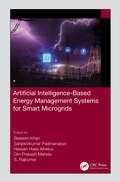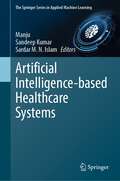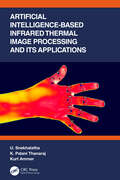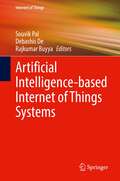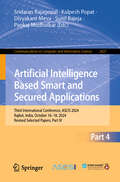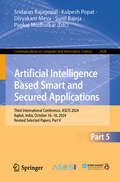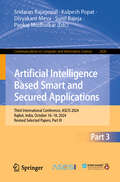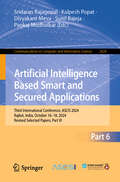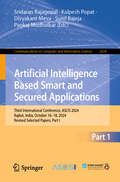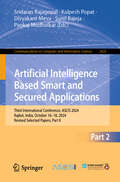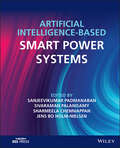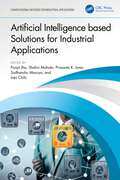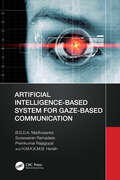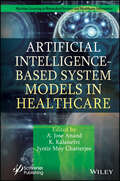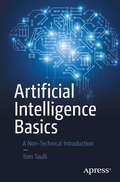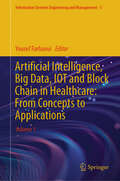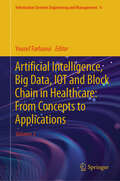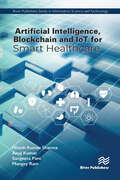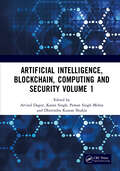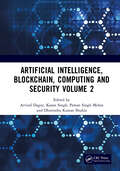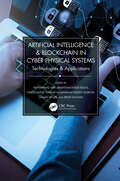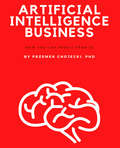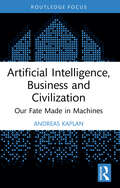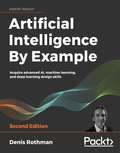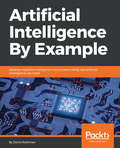- Table View
- List View
Artificial Intelligence-Based Energy Management Systems for Smart Microgrids
by Baseem KhanModeling and optimization of energy management systems for micro- and mini-grids play an important role in the fields of energy generation dispatch, system operation, protection coordination, power quality issues, and peak demand conflict with grid security. This comprehensive reference text provides an in-depth insight into these topics. This text discusses the use of meta-heuristic and artificial intelligence algorithms for developing energy management systems with energy use prediction for mini- and microgrid systems. It covers important concepts including modeling of microgrid and energy management systems, optimal protection coordination-based microgrid energy management, optimal energy dispatch with energy management systems, and peak demand management with energy management systems. Key Features: Presents a comprehensive discussion of mini- and microgrid concepts Discusses AC and DC microgrid modeling in detail Covers optimization of mini- and microgrid systems using AI and meta-heuristic techniques Provides MATLAB®-based simulations on a mini- and microgrid Comprehensively discussing concepts of microgrids with the help of software-based simulations, this text will be useful as a reference text for graduate students and professionals in the fields of electrical engineering, electronics and communication engineering, renewable energy, and clean technology.
Artificial Intelligence-based Healthcare Systems (The Springer Series in Applied Machine Learning)
by Manju Sandeep Kumar Sardar M. N. IslamThis book explores new applications in the field of science and technology for healthcare systems. The main focus of this book is to devise smart, efficient and robust solutions for the health care sector to serve the major population of rural areas. Artificial Intelligence-based Healthcare Systems encourages scientists, engineers, and scholars across the multiple disciplines to design smart intelligent innovations on rural healthcare issues and motivate to collaborate multiple ideas to design best solutions. It also helps the readers at various levels of knowledge to further enhance their understanding for new tools and smart solutions.
Artificial Intelligence-based Infrared Thermal Image Processing and its Applications
by U. Snekhalatha K. Palani Thanaraj Kurt AmmerInfrared thermography is a fast and non-invasive technology that provides a map of the temperature distribution on the body’s surface. This book provides a description of designing and developing a computer-assisted diagnosis (CAD) system based on thermography for diagnosing such common ailments as rheumatoid arthritis (RA), diabetes complications, and fever. It also introduces applications of machine-learning and deep-learning methods in the development of CAD systems. Key Features: • Covers applications of various image processing techniques in thermal imaging applications for the diagnosis of different medical conditions • Describes the development of a computer diagnostics system (CAD) based on thermographic data • Discusses deep-learning models for accurate diagnosis of various diseases • Includes new aspects in rheumatoid arthritis and diabetes research using advanced analytical tools • Reviews application of feature fusion algorithms and feature reduction algorithms for accurate classification of images This book is aimed at researchers and graduate students in biomedical engineering, medicine, image processing, and CAD.
Artificial Intelligence-based Internet of Things Systems (Internet of Things)
by Debashis De Rajkumar Buyya Souvik PalThe book discusses the evolution of future generation technologies through Internet of Things (IoT) in the scope of Artificial Intelligence (AI). The main focus of this volume is to bring all the related technologies in a single platform, so that undergraduate and postgraduate students, researchers, academicians, and industry people can easily understand the AI algorithms, machine learning algorithms, and learning analytics in IoT-enabled technologies. This book uses data and network engineering and intelligent decision support system-by-design principles to design a reliable AI-enabled IoT ecosystem and to implement cyber-physical pervasive infrastructure solutions. This book brings together some of the top IoT-enabled AI experts throughout the world who contribute their knowledge regarding different IoT-based technology aspects.
Artificial Intelligence Based Smart and Secured Applications: Third International Conference, ASCIS 2024, Rajkot, India, October 16–18, 2024, Revised Selected Papers, Part IV (Communications in Computer and Information Science #2427)
by Sridaran Rajagopal Kalpesh Popat Divyakant Meva Sunil Bajeja Pankaj MudholkarThe six-volume set, CCIS 2424 - 2429, constitutes the refereed proceedings of the Third International Conference on Advances in Smart Computing and Information Security, ASCIS 2024, held in Rajkot, Gujarat, India, in October 16–18, 2024. The 138 full papers and 43 short papers presented in these six volumes were carefully reviewed and selected from 667 submissions.The papers presented in these six volumes are organized in the following topical sections: Part I, II, III, IV: Artificial Intelligence & Machine Learning Part V: Smart Computing; Network and Cloud Computing. Part VI: Cyber Security; Computer Application for Sustainability.
Artificial Intelligence Based Smart and Secured Applications: Third International Conference, ASCIS 2024, Rajkot, India, October 16–18, 2024, Revised Selected Papers, Part V (Communications in Computer and Information Science #2428)
by Sridaran Rajagopal Kalpesh Popat Divyakant Meva Sunil Bajeja Pankaj MudholkarThe six-volume set, CCIS 2424 - 2429, constitutes the refereed proceedings of the Third International Conference on Advances in Smart Computing and Information Security, ASCIS 2024, held in Rajkot, Gujarat, India, in October 16–18, 2024. The 138 full papers and 43 short papers presented in these six volumes were carefully reviewed and selected from 667 submissions.The papers presented in these six volumes are organized in the following topical sections: Part I, II, III, IV: Artificial Intelligence & Machine Learning Part V: Smart Computing; Network and Cloud Computing. Part VI: Cyber Security; Computer Application for Sustainability.
Artificial Intelligence Based Smart and Secured Applications: Third International Conference, ASCIS 2024, Rajkot, India, October 16–18, 2024, Revised Selected Papers, Part III (Communications in Computer and Information Science #2426)
by Sridaran Rajagopal Kalpesh Popat Divyakant Meva Sunil Bajeja Pankaj MudholkarThe six-volume set, CCIS 2424 - 2429, constitutes the refereed proceedings of the Third International Conference on Advances in Smart Computing and Information Security, ASCIS 2024, held in Rajkot, Gujarat, India, in October 16–18, 2024. The 138 full papers and 43 short papers presented in these six volumes were carefully reviewed and selected from 667 submissions.The papers presented in these six volumes are organized in the following topical sections: Part I, II, III, IV: Artificial Intelligence & Machine Learning Part V: Smart Computing; Network and Cloud Computing. Part VI: Cyber Security; Computer Application for Sustainability.
Artificial Intelligence Based Smart and Secured Applications: Third International Conference, ASCIS 2024, Rajkot, India, October 16–18, 2024, Revised Selected Papers, Part VI (Communications in Computer and Information Science #2429)
by Sridaran Rajagopal Kalpesh Popat Divyakant Meva Sunil Bajeja Pankaj MudholkarThe six-volume set, CCIS 2424 - 2429, constitutes the refereed proceedings of the Third International Conference on Advances in Smart Computing and Information Security, ASCIS 2024, held in Rajkot, Gujarat, India, in October 16–18, 2024. The 138 full papers and 43 short papers presented in these six volumes were carefully reviewed and selected from 667 submissions.The papers presented in these six volumes are organized in the following topical sections: Part I, II, III, IV: Artificial Intelligence & Machine Learning Part V: Smart Computing; Network and Cloud Computing. Part VI: Cyber Security; Computer Application for Sustainability.
Artificial Intelligence Based Smart and Secured Applications: Third International Conference, ASCIS 2024, Rajkot, India, October 16–18, 2024, Revised Selected Papers, Part I (Communications in Computer and Information Science #2424)
by Sridaran Rajagopal Kalpesh Popat Divyakant Meva Sunil Bajeja Pankaj MudholkarThe six-volume set, CCIS 2424 - 2429, constitutes the refereed proceedings of the Third International Conference on Advances in Smart Computing and Information Security, ASCIS 2024, held in Rajkot, Gujarat, India, in October 16–18, 2024. The 138 full papers and 43 short papers presented in these six volumes were carefully reviewed and selected from 667 submissions.The papers presented in these six volumes are organized in the following topical sections: Part I, II, III, IV: Artificial Intelligence & Machine Learning Part V: Smart Computing; Network and Cloud Computing. Part VI: Cyber Security; Computer Application for Sustainability.
Artificial Intelligence Based Smart and Secured Applications: Third International Conference, ASCIS 2024, Rajkot, India, October 16–18, 2024, Revised Selected Papers, Part II (Communications in Computer and Information Science #2425)
by Sridaran Rajagopal Kalpesh Popat Divyakant Meva Sunil Bajeja Pankaj MudholkarThe six-volume set, CCIS 2424 - 2429, constitutes the refereed proceedings of the Third International Conference on Advances in Smart Computing and Information Security, ASCIS 2024, held in Rajkot, Gujarat, India, in October 16–18, 2024. The 138 full papers and 43 short papers presented in these six volumes were carefully reviewed and selected from 667 submissions.The papers presented in these six volumes are organized in the following topical sections: Part I, II, III, IV: Artificial Intelligence & Machine Learning Part V: Smart Computing; Network and Cloud Computing. Part VI: Cyber Security; Computer Application for Sustainability.
Artificial Intelligence-based Smart Power Systems
by Sanjeevikumar Padmanaban Sivaraman Palanisamy Sharmeela Chenniappan Jens Bo Holm-NielsenARTIFICIAL INTELLIGENCE-BASED SMART POWER SYSTEMS Authoritative resource describing artificial intelligence and advanced technologies in smart power systems with simulation examples and case studies Artificial Intelligence-based Smart Power Systems presents advanced technologies used in various aspects of smart power systems, especially grid-connected and industrial evolution. It covers many new topics such as distribution phasor measurement units, blockchain technologies for smart power systems, the application of deep learning and reinforced learning, and artificial intelligence techniques. The text also explores the potential consequences of artificial intelligence and advanced technologies in smart power systems in the forthcoming years. To enhance and reinforce learning, the editors include many learning resources throughout the text, including MATLAB, practical examples, and case studies. Artificial Intelligence-based Smart Power Systems includes specific information on topics such as: Modeling and analysis of smart power systems, covering steady state analysis, dynamic analysis, voltage stability, and more Recent advancement in power electronics for smart power systems, covering power electronic converters for renewable energy sources, electric vehicles, and HVDC/FACTs Distribution Phasor Measurement Units (PMU) in smart power systems, covering the need for PMU in distribution and automation of system reconfigurations Power and energy management systems Engineering colleges and universities, along with industry research centers, can use the in-depth subject coverage and the extensive supplementary learning resources found in Artificial Intelligence-based Smart Power Systems to gain a holistic understanding of the subject and be able to harness that knowledge within a myriad of practical applications.
Artificial Intelligence based Solutions for Industrial Applications (Computational Methods for Industrial Applications)
by Pooja Jha Shalini Mahato Prasanta K. Jana Sudhanshu Maurya Ines ChihiArtificial Intelligence based Solutions for Industrial Applications aims to examine the utilization of artificial intelligence (AI) technologies to tackle difficult industrial issues and offers readers a thorough understanding of how these technologies are being employed to address intricate industrial challenges and to stimulate innovation. This book explores the fundamental principles of artificial intelligence (AI) and its practical use in industrial environments. This book improves understanding of core concepts, the present state of the art and real-time implementation of AI in many industrial applications. This book describes the detailed implementation of AI in the industrial sector as well as related case studies for in-depth understanding. Basic concepts, related work reviews, illustrations, empirical results, and tables are integrated within each chapter to give the readers the opportunity to gain maximum knowledge and to easily understand the methodology and results presented.This book introduces a variety of smart algorithms to help in filtering important information and to solve problems in the application domains. Application of machine learning and deep learning in the industry demonstrates the capabilities by which it may be used to solve practical problems in the 'Fourth Industrial Revolution', and it equips readers with the necessary knowledge and tools to design solutions by themselves with the help of theory and practical examples dealt with. The fourth industrial revolution and its consequences on society and organizations are discussed in this book.Features: Detailed understanding of the industrial application of AI. Discussion of core concepts of different machine learning and deep learning techniques such as artificial neural networks, support vector machines, K –nearest neighbour, decision tree, logistic regression, and many more. Detailed study on various industrial applications of machine learning and deep learning in healthcare, education, entertainment, share market, manufacturing, and many more. Case studies on industrial application of AI Summataion of the fourth industrial revolution and its consquences on society and organizations. This book is primarily written for graduate students, engineers, and academic researchers, industrial practitioners, and anyone who wants to optimize production processes, explore AI technology, or stay ahead in the industrial field. It covers the complexities of AI in industrial contexts from core basic understanding to complex implementation.
Artificial Intelligence-Based System for Gaze-Based Communication
by B.G.D.A. Madhusanka Sureswaran Ramadass Premkumar Rajagopal H.M.K.K.M.B. HerathThis book focuses on the artificial neural network-based system for gaze-based communication. It covers the feasible and practical collaboration of human–computer interaction (HCI) in which a user can intuitively express tasks using gaze-based communication. It will target the vast applications of gaze-based communication using computer vision, image processing, and artificial intelligence.Artificial Intelligence-Based System for Gaze-Based Communication introduces a novel method to recognize the implicit intention of users by using nonverbal communication in combination with computer vision technologies. A novel HCI framework is developed to enable implicit and intuitive gaze-based intention communications. This framework allows the users to intuitively express their intention using natural gaze cues. The book also focuses on robot caregiving technology, which can understand the user’s intentions using minimal interactions with the user. The authors examine gaze-based tracking applications for the assisted living of elderly people. The book examines detailed applications of eye-gaze communication for real-life problems. It also examines the advantages that most people can handle gaze-based communications because it requires very little effort, and most of the elderly and impaired can retain visual capability.This book is ideally designed for students, researchers, academicians, and professionals interested in exploring and implementing gaze-based communication strategies and those working in the field of computer vision and image processing.
Artificial Intelligence-Based System Models in Healthcare
by A. Jose Anand K. Kalaiselvi Jyotir Moy ChatterjeArtificial Intelligence-Based System Models in Healthcare provides a comprehensive and insightful guide to the transformative applications of AI in the healthcare system. This book is a groundbreaking exploration of the synergies between artificial intelligence and healthcare innovation. In an era where technological advancements are reshaping the landscape of medical practices, this book provides a comprehensive and insightful guide to the transformative applications of AI in healthcare systems. From conceptual foundations to practical implementations, the book serves as a roadmap for understanding the intricate relationships between AI-based system models and the evolution of healthcare delivery. The first section delves into the fundamental role of technology in reshaping the healthcare landscape. With a focus on daily life activities, decision support systems, vision-based management, and semantic frameworks, this section lays the groundwork for understanding the pivotal role of AI in revolutionizing traditional healthcare approaches. Each chapter offers a unique perspective, emphasizing the intricate integration of technology into healthcare ecosystems. The second section takes a deep dive into specific applications of AI, ranging from predictive analysis and machine learning to deep learning, image analysis, and biomedical text processing. With a focus on decision-making support systems, this section aims to demystify the complex world of AI algorithms in healthcare, offering valuable insights into their practical implications and potential impact on patient outcomes. The final section addresses the modernization of healthcare practices and envisions the future landscape of AI applications. From medical imaging and diagnostics to predicting ventilation needs in intensive care units, modernizing health record maintenance, natural language processing, chatbots for medical inquiries, secured health insurance management, and glimpses into the future, the book concludes by exploring the frontiers of AI-driven healthcare innovations. Audience This book is intended for researchers and postgraduate students in artificial intelligence and the biomedical and healthcare sectors. Medical administrators, policymakers and regulatory specialists will also have an interest.
Artificial Intelligence Basics: A Non-Technical Introduction
by Tom TaulliArtificial intelligence touches nearly every part of your day. While you may initially assume that technology such as smart speakers and digital assistants are the extent of it, AI has in fact rapidly become a general-purpose technology, reverberating across industries including transportation, healthcare, financial services, and many more. In our modern era, an understanding of AI and its possibilities for your organization is essential for growth and success.Artificial Intelligence Basics has arrived to equip you with a fundamental, timely grasp of AI and its impact. Author Tom Taulli provides an engaging, non-technical introduction to important concepts such as machine learning, deep learning, natural language processing (NLP), robotics, and more. In addition to guiding you through real-world case studies and practical implementation steps, Taulli uses his expertise to expand on the bigger questions that surround AI. These include societal trends, ethics, and future impact AI will have on world governments, company structures, and daily life. Google, Amazon, Facebook, and similar tech giants are far from the only organizations on which artificial intelligence has had—and will continue to have—an incredibly significant result. AI is the present and the future of your business as well as your home life. Strengthening your prowess on the subject will prove invaluable to your preparation for the future of tech, and Artificial Intelligence Basics is the indispensable guide that you’ve been seeking. What You Will LearnStudy the core principles for AI approaches such as machine learning, deep learning, and NLP (Natural Language Processing)Discover the best practices to successfully implement AI by examining case studies including Uber, Facebook, Waymo, UiPath, and Stitch FixUnderstand how AI capabilities for robots can improve businessDeploy chatbots and Robotic Processing Automation (RPA) to save costs and improve customer serviceAvoid costly gotchasRecognize ethical concerns and other risk factors of using artificial intelligenceExamine the secular trends and how they may impact your business Who This Book Is For Readers without a technical background, such as managers, looking to understand AI to evaluate solutions.
Artificial Intelligence, Big Data, IOT and Block Chain in Healthcare: Volume 1 (Information Systems Engineering and Management #5)
by Yousef FarhaouiThis book covers a wide range of topics related to the integration of Artificial Intelligence, Big Data, IoT, and Blockchain: From Concepts to Applications. It begins by establishing a solid foundation and introducing the concepts and principles of each technology. The subsequent chapters delve into the various applications and use cases, providing readers with real-world examples of how AI, IoT, and Blockchain can be leveraged to address key challenges in Smart Environments. Data is becoming an increasingly decisive resource in modern societies, economies, and governmental organizations. Data science, Artificial Intelligence, and Smart Environments inspire novel techniques and theories drawn from mathematics, statistics, information theory, computer science, and social science. This book reviews the state of the art of big data analysis, Artificial Intelligence, and Smart Environments. It includes issues that pertain to signal processing, probability models, machine learning, data mining, databases, data engineering, pattern recognition, visualization, predictive analytics, data warehousing, data compression, computer programming, smart city, etc. The papers in this book were the outcome of research conducted in this field of study. The latter makes use of applications and techniques related to data analysis in general and big data and smart cities in particular. The authors hope that this book serves as a valuable resource and guide for readers, empowering them to navigate the intricate landscape of Artificial Intelligence, IoT, and Blockchain in Smart Environments. Let the authors embark on this transformative journey together, as the authors explore the concepts and applications that hold the potential to shape the future of Smart Environments. The book appeals to advanced undergraduate and graduate students, post-doctoral researchers, lecturers, and industrial researchers, as well as anyone interested in big data analysis and Artificial Intelligence.
Artificial Intelligence, Big Data, IOT and Block Chain in Healthcare: Volume 2 (Information Systems Engineering and Management #6)
by Yousef FarhaouiThis book covers a wide range of topics related to the integration of Artificial Intelligence, Big Data, IoT, and Blockchain: From Concepts to Applications. It begins by establishing a solid foundation and introducing the concepts and principles of each technology. The subsequent chapters delve into the various applications and use cases, providing readers with real-world examples of how AI, IoT, and Blockchain can be leveraged to address key challenges in Smart Environments. Data is becoming an increasingly decisive resource in modern societies, economies, and governmental organizations. Data science, Artificial Intelligence, and Smart Environments inspire novel techniques and theories drawn from mathematics, statistics, information theory, computer science, and social science. This book reviews the state of the art of big data analysis, Artificial Intelligence, and Smart Environments. It includes issues that pertain to signal processing, probability models, machine learning, data mining, databases, data engineering, pattern recognition, visualization, predictive analytics, data warehousing, data compression, computer programming, smart city, etc. The papers in this book were the outcome of research conducted in this field of study. The latter makes use of applications and techniques related to data analysis in general and big data and smart cities in particular. The authors hope that this book serves as a valuable resource and guide for readers, empowering them to navigate the intricate landscape of Artificial Intelligence, IoT, and Blockchain in Smart Environments. Let the authors embark on this transformative journey together, as the authors explore the concepts and applications that hold the potential to shape the future of Smart Environments. The book appeals to advanced undergraduate and graduate students, post-doctoral researchers, lecturers, and industrial researchers, as well as anyone interested in big data analysis and Artificial Intelligence.
Artificial Intelligence, Blockchain and IoT for Smart Healthcare
by Hitesh Kumar Sharma Anuj Kumar Sangeeta Pant Mangey RamThe concepts of telemedicine and e-healthcare have eased as well as improved the reachability of experienced doctors and medical staff to remote patients. A patient who is living in a remote village area can directly connect to specialist doctors across the globe though his/her mobile phone using telemedicine systems and e-healthcare services. In pandemic situations like COVID-19, these online platforms helped society to get medical treatment from their residence without any physical movement. Technology is transforming human lives by playing an important role in the planning, designing, and development of intelligent systems for better service. This book presents a cross-disciplinary perspective on the concept of machine learning, blockchain and IoT by congregating cutting-edge research and insights. It also identifies and discusses various advanced technologies such as internet of things (IoT), big data analytics, machine learning, artificial intelligence, cyber security, cloud computing, sensors and so on that are vital to foster the development of smart healthcare and telemedicine systems by providing effective solutions to the medical challenges faced by humankind.
Artificial Intelligence, Blockchain, Computing and Security Volume 1: Proceedings of the International Conference on Artificial Intelligence, Blockchain, Computing and Security (ICABCS 2023), Gr. Noida, UP, India, 24 - 25 February 2023
by Arvind Dagur Karan Singh Pawan Singh Mehra Dhirendra Kumar ShuklaThis book contains the conference proceedings of ICABCS 2023, a non-profit conference with the objective to provide a platform that allows academicians, researchers, scholars and students from various institutions, universities and industries in India and abroad to exchange their research and innovative ideas in the field of Artificial Intelligence, Blockchain, Computing and Security. It explores the recent advancement in field of Artificial Intelligence, Blockchain, Communication and Security in this digital era for novice to profound knowledge about cutting edges in artificial intelligence, financial, secure transaction, monitoring, real time assistance and security for advanced stage learners/ researchers/ academicians. The key features of this book are: Broad knowledge and research trends in artificial intelligence and blockchain with security and their role in smart living assistance Depiction of system model and architecture for clear picture of AI in real life Discussion on the role of Artificial Intelligence and Blockchain in various real-life problems across sectors including banking, healthcare, navigation, communication, security Explanation of the challenges and opportunities in AI and Blockchain based healthcare, education, banking, and related industries This book will be of great interest to researchers, academicians, undergraduate students, postgraduate students, research scholars, industry professionals, technologists, and entrepreneurs.
Artificial Intelligence, Blockchain, Computing and Security Volume 2: Proceedings of the International Conference on Artificial Intelligence, Blockchain, Computing and Security (ICABCS 2023), Gr. Noida, UP, India, 24 - 25 February 2023
by Arvind Dagur Karan Singh Pawan Singh Mehra Dhirendra Kumar ShuklaThis book contains the conference proceedings of ICABCS 2023, a non-profit conference with the objective to provide a platform that allows academicians, researchers, scholars and students from various institutions, universities and industries in India and abroad to exchange their research and innovative ideas in the field of Artificial Intelligence, Blockchain, Computing and Security. It explores the recent advancement in field of Artificial Intelligence, Blockchain, Communication and Security in this digital era for novice to profound knowledge about cutting edges in artificial intelligence, financial, secure transaction, monitoring, real time assistance and security for advanced stage learners/ researchers/ academicians. The key features of this book are: Broad knowledge and research trends in artificial intelligence and blockchain with security and their role in smart living assistance Depiction of system model and architecture for clear picture of AI in real life Discussion on the role of Artificial Intelligence and Blockchain in various real-life problems across sectors including banking, healthcare, navigation, communication, security Explanation of the challenges and opportunities in AI and Blockchain based healthcare, education, banking, and related industries This book will be of great interest to researchers, academicians, undergraduate students, postgraduate students, research scholars, industry professionals, technologists, and entrepreneurs.
Artificial Intelligence & Blockchain in Cyber Physical Systems: Technologies & Applications
by Muhammad Arif Faseeh QureshiThis book explores the intersection of blockchain technology, artificial intelligence (AI) and cyber physical systems (CPS). It discusses how these technologies can be integrated to create secure and efficient CPS solutions. The book covers various topics, including the basics of blockchain and AI, their applications in CPS and the challenges of integrating these technologies. It also explores real-world examples of how blockchain and AI are used in CPS, such as smart cities, transportation systems and healthcare. The authors delve into the technical aspects of how blockchain and AI can be used together to enhance CPS security, data privacy and interoperability. They also discuss the potential benefits and limitations of these technologies and provide insights into the future of CPS. Overall, this book provides a comprehensive overview of the use of blockchain and AI in CPS, making it a valuable resource for researchers, professionals and students in the fields of computer science, engineering and cybersecurity.
Artificial Intelligence Business: Expert tips and techniques for how to profit from AI
by Przemek ChojeckiThe concise guide to artificial intelligence for business people and commercially oriented data scientists Key Features • Find out how artificial intelligence is shaping the future of businesses • Discover how AI influences the society and its politics and economy • Explore the future of AI and its applications Book Description We're living in revolutionary times. Artificial intelligence is changing how the world operates and it determines how smooth certain processes are. For instance, when you go on a holiday, multiple services allow you to find the most convenient flights and the best hotels, you get personalized suggestions on what you might want to see, and you go to the airport via one of the ride-sharing apps. At each of these steps, AI algorithms are at work for your convenience. This book will guide you through everything, from what AI is to how it influences our economy and society. The book starts with an introduction to artificial intelligence and machine learning, and explains the importance of AI in the modern world. You'll explore how start-ups make key decisions with AI and how AI plays a major role in boosting businesses. Next, you'll find out how media companies use image generation techniques to create engaging content. As you progress, you'll explore how text generation and AI chatbot models simplify our daily lives. Toward the end, you'll understand the importance of AI in the education and healthcare sectors, and realize the risks associated with AI and how we can leverage AI effectively to help us in the future. By the end of this book, you'll have learned how machine learning works and have a solid understanding of the recent business applications of AI. What you will learn • Find out how AI helps in building innovative cultures in enterprises • Understand how AI boosts start-ups • Discover modern AI trends in the field of manufacturing and logistics • Explore the benefits of text and image generation applications • Study popular machine learning trends and their usage • Uncover the uses of AI in politics and society Who this book is for This book is for artificial intelligence enthusiasts or anyone with a business background who wants to learn how AI can scale up businesses.
Artificial Intelligence, Business and Civilization: Our Fate Made in Machines (Routledge Focus on Business and Management)
by Andreas KaplanArtificial intelligence is shaking up economies around the world as well as society at large and is predicted to be either the best or worst thing to happen to humanity. This book looks at what exactly artificial intelligence is, how it can be classified, how it differentiates from other concepts such as machine learning, big data, blockchain, or the Internet-of-Things, and how it has evolved and might evolve over time. Providing a clear and unbiased picture of artificial intelligence, the book provides critical analyses of the advantages and disadvantages, opportunities and threats of AI progress for business and civilisation. Solutions and possible directions of how humanity might deal with rapid development and evolutions will be given and discussed, and consider regulation, employment, ethics, education and international cooperation. Unlike existing literature, this book provides a comprehensive overview of AI based on detailed analysis and insight. Finally, several real-life examples from various sectors and industries, including for profit organizations, higher education, and government, will substantiate and illustrate the presented concepts, classifications, and discussions. This book is of interest to researchers, educators, students, and practitioners alike who desire to understand AI in its broad lines and discover the latest research and studies within the field.
Artificial Intelligence By Example: Acquire advanced AI, machine learning, and deep learning design skills, 2nd Edition
by Denis RothmanUnderstand the fundamentals and develop your own AI solutions in this updated edition packed with many new examples Key Features AI-based examples to guide you in designing and implementing machine intelligence Build machine intelligence from scratch using artificial intelligence examples Develop machine intelligence from scratch using real artificial intelligence Book Description AI has the potential to replicate humans in every field. Artificial Intelligence By Example, Second Edition serves as a starting point for you to understand how AI is built, with the help of intriguing and exciting examples. This book will make you an adaptive thinker and help you apply concepts to real-world scenarios. Using some of the most interesting AI examples, right from computer programs such as a simple chess engine to cognitive chatbots, you will learn how to tackle the machine you are competing with. You will study some of the most advanced machine learning models, understand how to apply AI to blockchain and Internet of Things (IoT), and develop emotional quotient in chatbots using neural networks such as recurrent neural networks (RNNs) and convolutional neural networks (CNNs). This edition also has new examples for hybrid neural networks, combining reinforcement learning (RL) and deep learning (DL), chained algorithms, combining unsupervised learning with decision trees, random forests, combining DL and genetic algorithms, conversational user interfaces (CUI) for chatbots, neuromorphic computing, and quantum computing. By the end of this book, you will understand the fundamentals of AI and have worked through a number of examples that will help you develop your AI solutions. What you will learn Apply k-nearest neighbors (KNN) to language translations and explore the opportunities in Google Translate Understand chained algorithms combining unsupervised learning withdecision trees Solve the XOR problem with feedforward neural networks (FNN) and buildits architecture to represent a data flow graph Learn about meta learning models withhybrid neural networks Create a chatbot and optimize its emotional intelligence deficiencies withtools such as Small Talk and data logging Building conversational user interfaces (CUI) for chatbots Writing genetic algorithms that optimizedeep learning neural networks Build quantum computing circuits Who this book is for Developers and those interested in AI, who want to understand the fundamentals of Artificial Intelligence and implement them practically. Prior experience with Python programming and statistical knowledge is essential to make the most out of this book.
Artificial Intelligence By Example: Develop machine intelligence from scratch using real artificial intelligence use cases
by Denis RothmanBe an adaptive thinker that leads the way to Artificial IntelligenceKey FeaturesAI-based examples to guide you in designing and implementing machine intelligenceDevelop your own method for future AI solutionsAcquire advanced AI, machine learning, and deep learning design skillsBook DescriptionArtificial Intelligence has the potential to replicate humans in every field. This book serves as a starting point for you to understand how AI is built, with the help of intriguing examples and case studies.Artificial Intelligence By Example will make you an adaptive thinker and help you apply concepts to real-life scenarios. Using some of the most interesting AI examples, right from a simple chess engine to a cognitive chatbot, you will learn how to tackle the machine you are competing with. You will study some of the most advanced machine learning models, understand how to apply AI to blockchain and IoT, and develop emotional quotient in chatbots using neural networks.You will move on to designing AI solutions in a simple manner rather than get confused by complex architectures and techniques. This comprehensive guide will be a starter kit for you to develop AI applications on your own.By the end of this book, will have understood the fundamentals of AI and worked through a number of case studies that will help you develop business vision.What you will learnUse adaptive thinking to solve real-life AI case studiesRise beyond being a modern-day factory code workerAcquire advanced AI, machine learning, and deep learning designing skillsLearn about cognitive NLP chatbots, quantum computing, and IoT and blockchain technologyUnderstand future AI solutions and adapt quickly to themDevelop out-of-the-box thinking to face any challenge the market presentsWho this book is forArtificial Intelligence by Example is a simple, explanatory, and descriptive guide for junior developers, experienced developers, technology consultants, and those interested in AI who want to understand the fundamentals of Artificial Intelligence and implement it practically by devising smart solutions. Prior experience with Python and statistical knowledge is essential to make the most out of this book.
